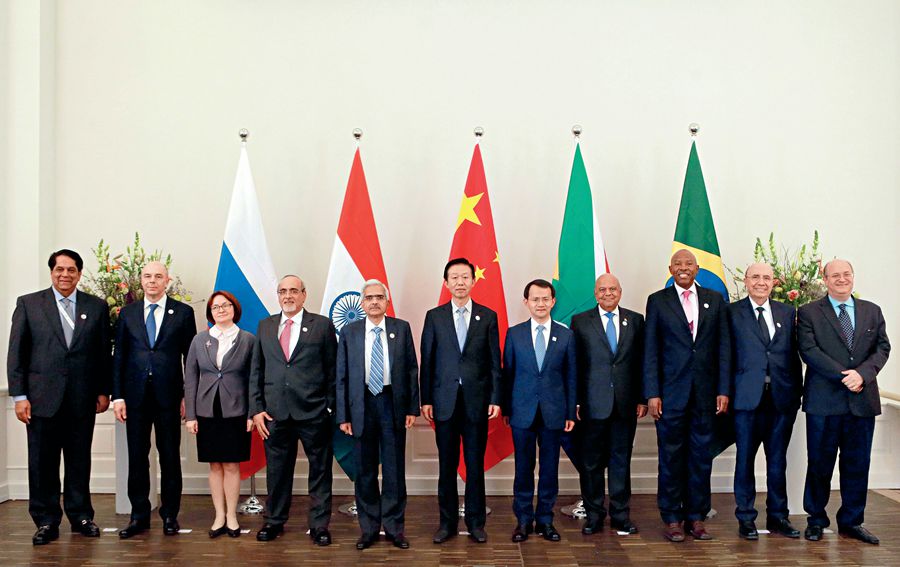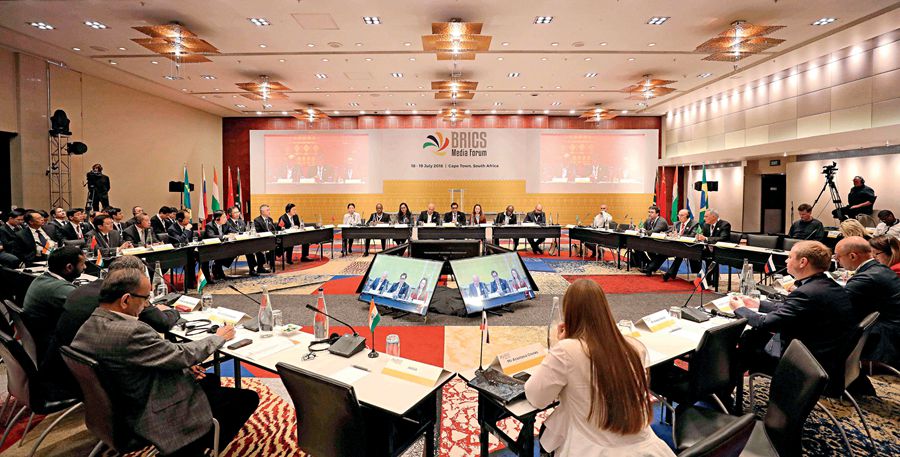THE rise of a bloc of emerging economies since the turn of the millennium has polarized attention throughout the international community. The phenomenon reflects changes in the international balance of power and provides well-grounded logic for the inevitable adjustment and reform of the global governance system. Burgeoning South-South Cooperation and multilateral partnerships feature prominently in this process. The multilateral mechanisms promoted by emerging economies, meanwhile, display immense vitality, and play an ever-greater role in regional and global affairs.
BRICS, comprising the five major emerging economies of Brazil, Russia, India, China, and South Africa, is one such multilateral platform. Cooperation under this framework has been both dynamic and effective since the first BRICS Summit in 2009, having extended from business sectors to multiple areas of global significance. Innovation is the focus of the upcoming 11th BRICS Summit that will convene in Brazil, so highlighting the bloc’s commitment to global innovation-driven economic development.

A performance at the opening ceremony of the 2017 BRICS Games in Guangzhou, China on June 17.
Western media have been skeptical about BRICS, pointing out the differences and competition between its members. However, such critics have overlooked the powerful internal motivation for BRICS cooperation, evident in the states’ united determination to change an unbalanced and ineffective global governance system. Their will and determination in this regard, at least over the past 10 years, has cancelled out those problems engendered by internal differences. BRICS has now emerged as an important soft balancing force in the current U.S.-dominated global order.
American political scientist Robert Anthony Pape holds that soft balancing is a viable strategy for emerging major powers to counter the American superpower, and that their diplomatic alliance enables them to constrain the U.S.’s behavior. Many emerging platforms for multilateral cooperation, including the BRICS, provide ways for weaker countries to pursue soft balancing strategies that gain them room to maneuver under the ethos of stronger powers.
The changing global landscape whereon BRICS plays such a growingly important role has compelled the five member states to prioritize their cooperation on international strategies. This raises the question, “How does BRICS cooperation benefit its member states?” For Brazil, BRICS cooperation creates external opportunities for the country to grow its economy. Emerging economies — or developing countries — indeed play an ever-greater role in the global economy, to the extent that they are becoming the projected growth poles of the world economy in the medium and long run.
A review of Brazil’s modern history highlights the implications that changing global economic focuses have had for the country’s foreign policies. Cooperation with emerging economies offers Brazil external opportunities to realize its economic and social development goals. BRICS, meanwhile, enables Brazil to taper off its dependence on developed countries and build up economic resilience and autonomy. As China’s development amply demonstrates, diversifying partnerships is an effective way for developing countries to gain greater autonomy.

Representatives pose for a group photo during the first BRICS Finance Ministers and Central Bank Governors Meeting in Baden-Baden, Germany on March 17, 2017.
Multilateralism, moreover, has been a diplomatic tradition for Brazil. Active participation in multilateral cooperation via the BRICS platform has enabled Brazil and other major emerging countries to make concerted efforts in amplifying their voice in international affairs and establish a widely-recognized image in the international community.
Brazil has indeed benefited greatly from BRICS cooperation, especially its economic partnerships with other BRICS member states. From 2009 to 2013, average annual trade between Brazil and other BRICS member states expanded by an annual 27 percent, outpacing the average annual 20.1 percent growth of Brazil’s foreign trade with developing countries. Even in 2013, when Brazil’s foreign trade showed a declining trend, the country’s trade with BRICS member states shrank the least.
From 2013 to 2016, Brazil’s trade with BRICS countries shrank the least — about 30.5 percent. As to the balance of trade, from 2009 to 2016 Brazil had a trade surplus with other BRICS countries whereas, other than in 2016 when it gained a surplus of US $4.14 billion, it experienced trade deficits with developed economies. In terms of trade, BRICS has stabilized both Brazil’s foreign trade and the core markets wherein to earn foreign exchanges. The New Development Bank initiated by the economic bloc also provides an alternative source of finance.
Cooperation under the BRICS framework opens new ways for member states to participate in international political and security affairs. Although its focus has been on building economic and trade cooperation mechanisms and advancing reforms to the global financial system, the group also wields a growing influence on international political and security issues. It is to some extent a soft balancing force against U. S. power which, especially during regional conflicts, limits its unilateral military actions. With more channels for dialogue and a wider range of topics for negotiation, BRICS member states are building a broader consensus on global political and security issues.

Representatives attend the 3rd BRICS Media Forum in Cape Town, South Africa, on July 18, 2018.
In 2019, Brazil assumed the BRICS rotating presidency and will host the annual BRICS summit. In view of the benefits accrued from BRICS cooperation and its diplomatic tradition of pursuing multilateralism, Brazil continues to coordinate with emerging economies on global governance, and has made technology, innovation, and digital economy the theme of the 2019 summit.
Today, the world is fraught with unprecedented changes that are rocking the prevailing global order. The emerging powers are the main force behind these changes, but under such a backdrop, hindrances and uncertainties lie ahead. For example, the hegemonic power has resorted to unilateralism and protectionism policies in efforts to impede the rise of emerging countries and their strengthening cooperation, having gone to the extent of trying to tempt them to join their side or just isolate them. As for global governance, the hegemonic power has challenged the established international regime through its irresponsible unilateral act of withdrawal from international organizations and treaties — actions antithetical to the multilateral cooperation advocated by emerging countries.
Multilateralism is a diplomatic tradition for Brazil, and also remains a focus of China’ diplomacy. Apart from BRICS, China has also initiated platforms for multilateral cooperation such as the Shanghai Cooperation Organization, the Boao Forum for Asia, the Asia Infrastructure Investment Bank, the Forum on China-Africa Cooperation, and the Community of Latin American and Caribbean States (CELAC). It also set up the China-UN Peace and Development Fund and funds for South-South and China-CELAC cooperation. BRICS cooperation exemplifies the effectiveness of multilateralism. It is a principle that has enabled BRICS members to pursue common aspirations by putting aside minor differences and advancing towards the next golden decade of cooperation.
Amid unprecedented changes, peoples of the world need multilateralism more than ever before. As the new leading lights of the global governance system, BRICS countries are clearly determined to champion multilateralism, the international system with the UN at the core, the global order with international law as the basis, and the multilateral trade system as represented by the World Trade Organization. They may thus safeguard the common interests and development opportunities of emerging markets and developing countries.
ZHOU ZHIWEI is a researcher at the Institution of Latin American Studies with the Chinese Academy of Social Sciences.


